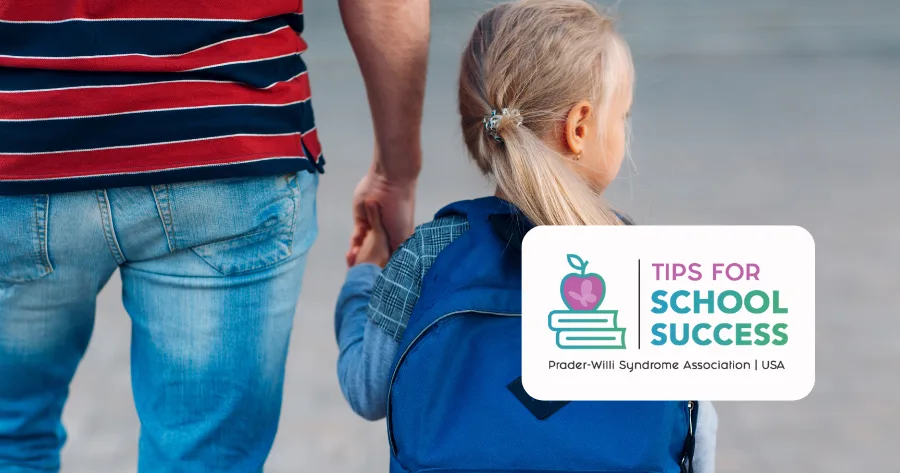Creating a master file that contains the enormous amount of paperwork your child with special education needs will not only keep you organized and aid you in preparing for all interactions with the school district but will give you a clearer understanding of your child’s special education needs and progress.
Schools often keep records in several different places, which leads to information and reports being misplaced over time. You never know when you will need to refer to a document from several years ago. By creating and organizing your child’s file, you will have all of the information regarding their special education in one place. PWSA | USA's Family Support Director Stacy Ward recommends using a 5-inch binder organized by year. You may have several binders by the time your child completes high school.
What Documents Should I Keep?
If your child has not started school yet, you can skip this section and head to "Organizing My File."
The first step is to gather all of the documents related to your child’s education. This includes emails, IEPs, evaluations, progress reports, report cards, all correspondence, samples of your child’s work, and medical documents related to their diagnosis. Request in writing a copy of your child’s complete file from the school district. Be polite in your request, offer to do anything you can to help expedite the request, and expect to pay a photocopying fee. Make additional copies of everything you receive. Write the document date in the top right corner of each master document - you may need to erase this later, so use a pencil.
Organizing My File
Add dividers to your binder organizing it by year. Begin filing your documents in your binder in chronological order. Some parents say placing each of the documents in protective sleeves is helpful in preserving the document, as well as looking through them quickly during a meeting. Each time you obtain a document, send an email or letter, print it, or make a copy, and add it to your file.
Create a table of contents or a document list that includes the date of the document, who the author is, what type of document it is (e.g., IEP, evaluations) and significance. You may not need to complete the significance for every document; however, you should note in each document that has testing data or is related to behavior challenges.
Your file will be an excellent resource for you as you advocate on your child’s behalf. Should you ever need to consult with an education advocate or attorney, having your documents already in a file and in chronological order will be a great assistance to them. They too will be able to see the bigger picture and gain an understanding of your child’s academic and functional needs.
Share this!





 Perry A. Zirkel has written more than 1,500 publications on various aspects of school law, with an emphasis on legal issues in special education. He writes a regular column for NAESP’s Principal magazine and NASP’s Communiqué newsletter, and he did so previously for Phi Delta Kappan and Teaching Exceptional Children.
Perry A. Zirkel has written more than 1,500 publications on various aspects of school law, with an emphasis on legal issues in special education. He writes a regular column for NAESP’s Principal magazine and NASP’s Communiqué newsletter, and he did so previously for Phi Delta Kappan and Teaching Exceptional Children. Jennifer Bolander has been serving as a Special Education Specialist for PWSA (USA) since October of 2015. She is a graduate of John Carroll University and lives in Ohio with her husband Brad and daughters Kate (17), and Sophia (13) who was born with PWS.
Jennifer Bolander has been serving as a Special Education Specialist for PWSA (USA) since October of 2015. She is a graduate of John Carroll University and lives in Ohio with her husband Brad and daughters Kate (17), and Sophia (13) who was born with PWS. Dr. Amy McTighe is the PWS Program Manager and Inpatient Teacher at the Center for Prader-Willi Syndrome at the Children’s Institute of Pittsburgh. She graduated from Duquesne University receiving her Bachelor’s and Master’s degree in Education with a focus on elementary education, special education, and language arts.
Dr. Amy McTighe is the PWS Program Manager and Inpatient Teacher at the Center for Prader-Willi Syndrome at the Children’s Institute of Pittsburgh. She graduated from Duquesne University receiving her Bachelor’s and Master’s degree in Education with a focus on elementary education, special education, and language arts. Evan has worked with the Prader-Willi Syndrome Association (USA) since 2007 primarily as a Crisis Intervention and Family Support Counselor. Evans works with parents and schools to foster strong collaborative relationships and appropriate educational environments for students with PWS.
Evan has worked with the Prader-Willi Syndrome Association (USA) since 2007 primarily as a Crisis Intervention and Family Support Counselor. Evans works with parents and schools to foster strong collaborative relationships and appropriate educational environments for students with PWS. Staci Zimmerman works for Prader-Willi Syndrome Association of Colorado as an Individualized Education Program (IEP) consultant. Staci collaborates with the PWS multi-disciplinary clinic at the Children’s Hospital in Denver supporting families and school districts around the United States with their child’s Individual Educational Plan.
Staci Zimmerman works for Prader-Willi Syndrome Association of Colorado as an Individualized Education Program (IEP) consultant. Staci collaborates with the PWS multi-disciplinary clinic at the Children’s Hospital in Denver supporting families and school districts around the United States with their child’s Individual Educational Plan. Founded in 2001, SDLC is a non-profit legal services organization dedicated to protecting and advancing the legal rights of people with disabilities throughout the South. It partners with the Southern Poverty Law Center, Protection and Advocacy (P&A) programs, Legal Services Corporations (LSC) and disability organizations on major, systemic disability rights issues involving the Individuals with Disabilities Education Act (IDEA), Americans with Disabilities Act (ADA), and the federal Medicaid Act. Recently in November 2014, Jim retired.
Founded in 2001, SDLC is a non-profit legal services organization dedicated to protecting and advancing the legal rights of people with disabilities throughout the South. It partners with the Southern Poverty Law Center, Protection and Advocacy (P&A) programs, Legal Services Corporations (LSC) and disability organizations on major, systemic disability rights issues involving the Individuals with Disabilities Education Act (IDEA), Americans with Disabilities Act (ADA), and the federal Medicaid Act. Recently in November 2014, Jim retired.